Table of Contents Show
There may be products. Products are independently selected by our editors. We may earn an affiliate commission from the links with no charge to you, example: as Amazon Affiliate.
You’ll find yourself transported through time with these historian-approved masterpieces: “A Land Remembered” chronicles Florida’s wilderness transformation, while “The Book of Lost Friends” weaves dual timelines of freedom and identity. “Bring Up the Bodies” draws you into Tudor politics, “The Queen’s Fortune” exposes Napoleon’s France, and “Salt to the Sea” uncovers forgotten WWII tragedies. Each book offers meticulously researched details and compelling characters that’ll make history come alive in ways you never imagined.
Key Takeaways
- Wolf Hall series, particularly “Bring Up the Bodies,” offers an intimate portrayal of Tudor England through Thomas Cromwell’s masterfully crafted perspective.
- “Salt to the Sea” provides powerful immersion into WWII Prussia through four refugee perspectives and meticulous historical research.
- “A Land Remembered” transports readers through Florida’s transformation from wilderness to modern development with authentic character voices.
- “The Book of Lost Friends” weaves dual timelines between 1875 and 1987, creating rich historical connections through compelling women’s narratives.
- “The Queen’s Fortune” brings Napoleonic France alive through detailed political dynamics and intimate portrayal of historical figures.
A Land Remembered
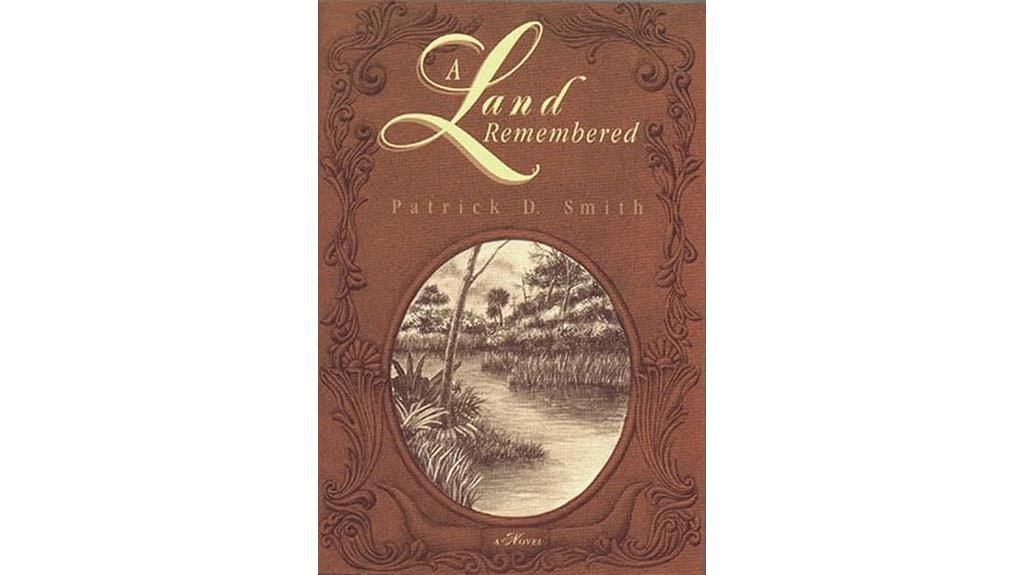
If you’re drawn to stories that capture Florida’s transformation from untamed wilderness to modern development, “A Land Remembered” offers a powerful journey through the state’s rich history. Following the MacIvey family’s saga, you’ll witness the struggles and triumphs of early Florida settlers through vivid, engaging storytelling.
While some readers question the authenticity of certain historical interactions, particularly regarding race relations, you’ll find the book’s clear descriptions and character development create an immersive experience. The narrative resonates deeply with those who’ve witnessed Florida’s dramatic changes, from the draining of the Everglades to the rise of coastal developments, making it essential reading for understanding the state’s evolution.
Best For: Readers interested in Florida’s history, particularly those who appreciate multi-generational family sagas and want to understand the state’s transformation from frontier wilderness to modern development.
Pros:
- Vivid, engaging storytelling that brings Florida’s historical landscape and pioneer life to life
- Multi-generational narrative effectively shows the state’s dramatic transformation over time
- Strong character development and emotional depth that keeps readers invested in the story
Cons:
- Historical interactions, especially regarding race relations, may be oversimplified or idealized
- Some readers might find the pacing slow in certain sections
- Cultural authenticity is questioned, particularly in the portrayal of relationships between different ethnic groups
The Book of Lost Friends: A Novel
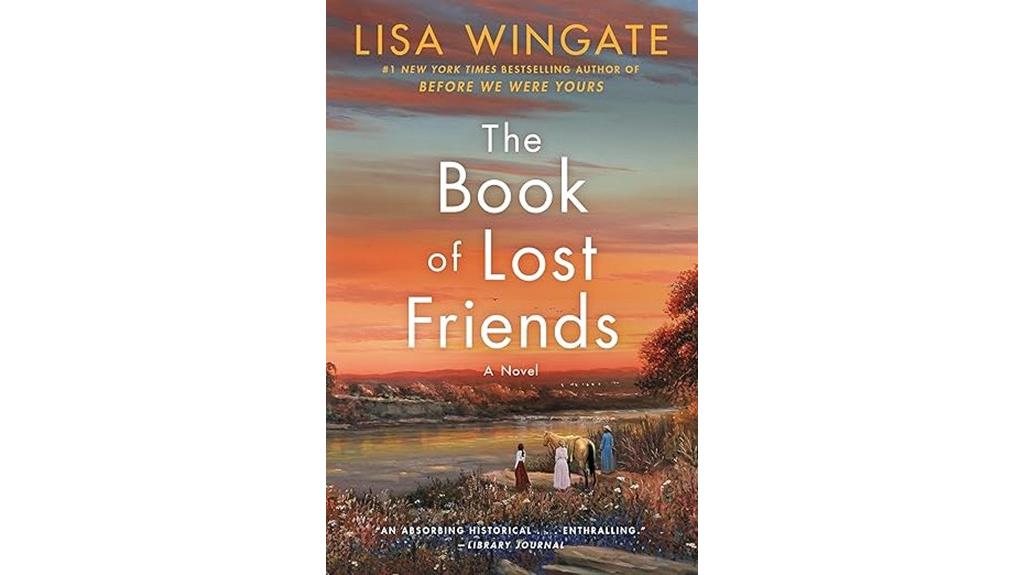
Lisa Wingate’s “The Book of Lost Friends” captivates readers who love intricate historical narratives that bridge different time periods. You’ll follow two compelling storylines: Hannie Gossett’s 1875 quest to find her lost family and Benedetta Silva’s 1987 journey as a teacher in Louisiana.
Set against the backdrop of Louisiana and Texas, you’ll discover how these women’s lives intertwine through shared history. As Hannie chronicles lost friends in her journal, Benedetta encourages her students to explore their own ancestral stories. The novel’s rich atmosphere, from humid landscapes to aging plantation estates, creates an immersive experience that’ll transport you through time while exploring themes of freedom, privilege, and identity.
Best For: Readers who enjoy dual-timeline historical fiction with themes of family connection, personal identity, and the impact of American slavery’s legacy.
Pros:
- Masterfully interweaves two compelling timelines that meaningfully connect across generations
- Rich, atmospheric descriptions of Louisiana and Texas settings that enhance the storytelling
- Strong character development, particularly in Hannie’s storyline
Cons:
- Some readers may find Benedetta’s 1987 storyline less engaging than Hannie’s historical narrative
- The plot can feel lengthy at times with occasional pacing issues
- Some secondary plot points and character arcs remain unresolved
Bring Up the Bodies: A Novel (Wolf Hall Series Book 2)
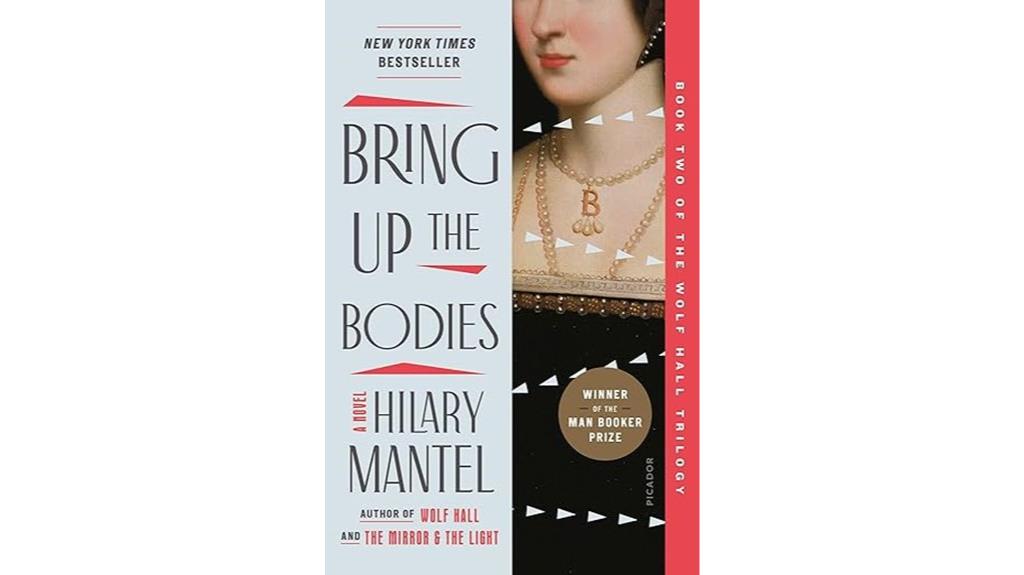
Fans of intricate political drama and masterful historical storytelling will find their perfect match in “Bring Up the Bodies,” the second installment of Hilary Mantel’s Wolf Hall trilogy.
Through Thomas Cromwell’s calculating eyes, you’ll witness the downfall of Anne Boleyn in Tudor England’s treacherous court. Mantel’s unique third-person narrative draws you into a domain where power shifts like quicksand, and failure to produce a male heir can spell doom.
You’ll discover Cromwell’s complex character – at once generous and vengeful – as he navigates Henry VIII’s demands while orchestrating the domain’s transformation from medieval to modern governance. The novel’s award-winning prose delivers both historical accuracy and emotional depth.
Best For: Readers who enjoy sophisticated historical fiction with complex political intrigue and appreciate meticulously researched Tudor-era details combined with literary prose.
Pros:
- Masterful prose with unique third-person narrative style that creates immediacy and intimacy
- Complex, nuanced portrayal of Thomas Cromwell that challenges traditional historical perspectives
- Rich in historical detail while maintaining dramatic tension and emotional depth
Cons:
- Dense writing style and political complexity may be challenging for casual readers
- Requires familiarity with Wolf Hall (Book 1) to fully appreciate the narrative
- Multiple characters and historical figures can be difficult to track without prior Tudor knowledge
The Queens Fortune: A Novel of Desiree, Napoleon, and the Dynasty
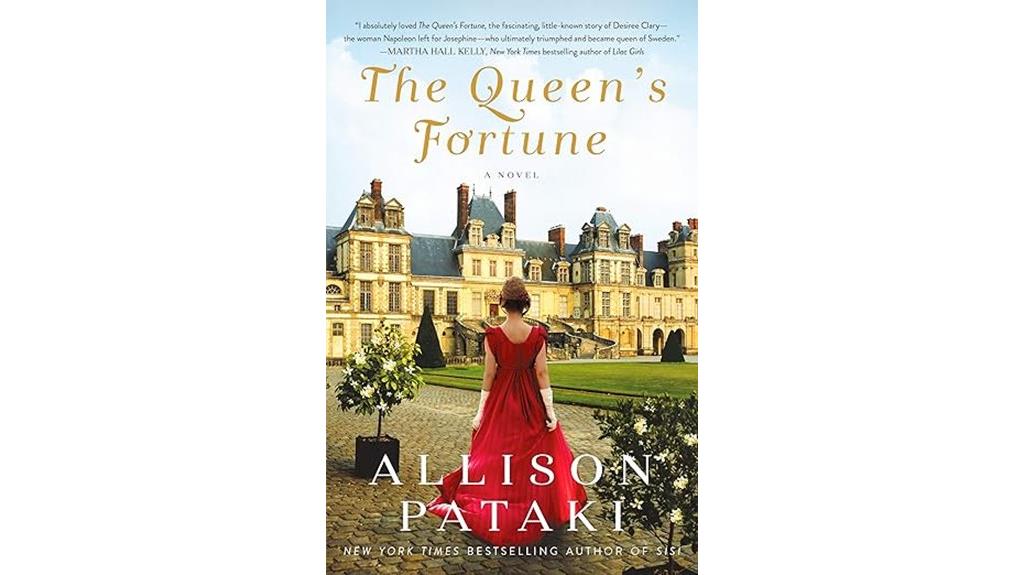
Readers seeking an immersive journey through Napoleonic France will find themselves captivated by Allison Pataki’s “The Queen’s Fortune.” This richly detailed historical novel explores the fascinating life of Desiree Bernadotte, Napoleon Bonaparte’s first love who later became Queen of Sweden.
You’ll witness history unfold through Desiree’s unique perspective as she navigates complex relationships with Napoleon, Josephine, and the Bonaparte family. While some historical details have sparked debate among scholars, Pataki’s engaging narrative style brings the era to life through compelling character development and political intrigue. If you’re drawn to tales of survival, romance, and royal drama during one of history’s most turbulent periods, this book won’t disappoint.
Best For: Historical fiction enthusiasts who enjoy intimate perspectives on major historical figures and events, particularly those interested in Napoleonic France and stories of remarkable women in history.
Pros:
- Engaging narrative style that brings historical figures to life through compelling character development
- Unique perspective on Napoleon and his era through the eyes of his first love, Desiree
- Rich in detail about French Revolution era politics, relationships, and social dynamics
Cons:
- Some historical inaccuracies and debatable portrayals of key figures
- Certain character depictions may conflict with documented historical records
- May disappoint readers seeking strictly factual historical accounts rather than dramatized interpretations
Salt To The Sea (Thorndike Press Large Print Literacy Bridge Series)
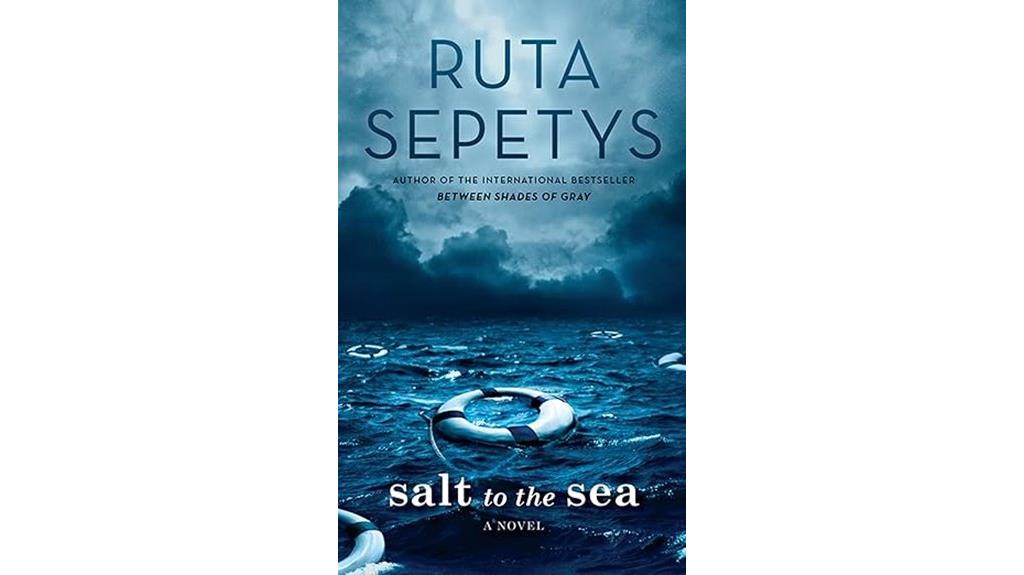
This gripping historical fiction masterpiece sheds light on one of World War II’s forgotten tragedies through the eyes of four young refugees. You’ll follow Joana, a Lithuanian nurse; Florian, a mysterious young man; Emilia, a Polish girl harboring secrets; and Alfred, a disturbed German sailor as they navigate the perils of war-torn Prussia in 1945.
Through short, intense chapters and alternating perspectives, you’re thrust into the raw emotions and desperate circumstances leading to the devastating Wilhelm Gustloff maritime disaster. Sepetys’s meticulous research and vivid prose bring authenticity to this heart-wrenching tale of survival, guilt, and human resilience.
Best For: Readers interested in historical fiction who want to learn about lesser-known WWII events through an emotionally engaging story with multiple perspectives.
Pros:
- Short, fast-paced chapters with alternating viewpoints keep readers engaged
- Well-researched historical details provide authentic context for the tragic events
- Complex characters with deep emotional development and compelling personal secrets
Cons:
- Initially jarring transitions between multiple narrators
- Some readers may find the tragic content and war themes disturbing
- Could benefit from more detailed historical context of the wider WWII period
Factors to Consider When Choosing Historical Fiction Books That Bring History to Vivid Life
When you’re selecting historical fiction that truly captures the essence of the past, you’ll want to weigh how authors balance historical accuracy with dramatic storytelling while examining their narrative voice and grasp of the time period. You’ll find the most compelling books feature well-developed characters who authentically reflect their era’s mindset and social norms, rather than modern sensibilities transplanted into historical settings. The richest historical fiction transports you through meticulous attention to setting and cultural details, from period-appropriate dialogue to accurate descriptions of daily life, customs, and societal structures.
Historical Accuracy vs. Drama
Finding the perfect balance between historical accuracy and dramatic storytelling remains one of the most essential factors when selecting historical fiction books. You’ll want to look for authors who’ve done their homework through extensive research, interviews, and historical documentation while still crafting an engaging narrative that keeps you turning pages.
The best historical fiction works, like “Bring Up the Bodies” and “Salt to the Sea,” demonstrate how meticulous research can enhance rather than hinder storytelling. While authors may take creative liberties to develop characters or heighten drama, these choices shouldn’t fundamentally alter historical truths. When evaluating a book’s balance, consider how well it educates you about the period while maintaining emotional resonance. Great historical fiction doesn’t just tell you what happened – it makes you feel like you’re living through the events yourself.
Narrative Voice and Style
A compelling narrative voice serves as the bridge between modern readers and historical events, making the past come alive through carefully crafted prose and perspective. You’ll find that masterful works like *Bring Up the Bodies* use unique third-person perspectives to create poetic rhythms that transport you to Tudor England.
When you’re choosing historical fiction, look for clear, engaging writing styles that build emotional connections through vivid descriptions, as seen in *A Land Remembered*. The best authors, like Lisa Wingate in *The Book of Lost Friends*, skillfully weave multiple timelines and perspectives while maintaining distinct character voices. They’ll help you understand complex historical periods through well-paced storytelling and rich characterization, ensuring you’re not just reading about history—you’re experiencing it through the eyes of those who lived it.
Time Period Knowledge Required
To fully immerse yourself in historical fiction, you’ll need a basic grasp of the era you’re exploring. Understanding key events, social norms, and political dynamics will help you connect with characters and their motivations. You’ll appreciate subtle references and cultural nuances that might otherwise slip past unnoticed.
Pay attention to the language and terminology specific to the period – it’s not just about the words characters use, but how they express themselves within their historical context. Be mindful of different historical perspectives and ongoing debates about certain events. While you don’t need to be a history expert, recognizing your own modern biases and assumptions will deepen your reading experience. Remember that historical knowledge often evolves as new evidence emerges, adding layers to your interpretation of the story.
Character Development and Authenticity
When selecting historical fiction, compelling character development becomes the bridge between past and present. You’ll want to look for books that feature multi-dimensional characters who authentically reflect their era’s challenges and social dynamics. Strong historical narratives, like *Bring Up the Bodies*, showcase complex personalities that bring historical figures to life while maintaining period accuracy.
Pay attention to how authors use distinct voices and perspectives to create emotional depth. Books like *Salt to the Sea* and *The Book of Lost Friends* excel at this through multiple narrators who offer diverse viewpoints of historical events. The most engaging characters, such as Desiree in *The Queen’s Fortune*, connect with readers by embodying universal themes of survival and identity while remaining true to their historical context.
Setting and Cultural Details
Setting and atmosphere shape the foundation of compelling historical fiction. When you’re selecting a historical novel, look for works that transport you through vivid geographical and cultural details of the chosen era. You’ll want to find books that masterfully weave period-specific customs, dialects, and social norms into the narrative fabric, similar to how “A Land Remembered” captures Florida’s rich historical landscape.
Pay attention to how authors portray the daily lives and societal structures of the time period. The best historical fiction doesn’t just tell you about the past – it immerses you in it. Look for stories that balance historical accuracy with narrative flow, where the setting authentically reflects the era’s challenges and triumphs. The environment should feel lived-in, with cultural details that naturally enhance the story rather than overshadow it.
Research Quality Behind Story
Behind every compelling historical fiction book lies a foundation of meticulous research that brings authenticity to the narrative. You’ll want to look for books where authors demonstrate their commitment to accuracy through extensive research, including interviews with specialists and survivors. Check if the book includes research notes or a bibliography at the end, as these additions reveal the depth of historical investigation.
Pay attention to how characters interact with historical events. The best historical fiction weaves factual details seamlessly into the story while maintaining emotional authenticity. When you’re evaluating a book’s research quality, consider how well the author balances historical accuracy with storytelling. Books that inspire you to learn more about the actual events often indicate thorough research and skilled storytelling working together.
Multiple Timeline Management
Historical fiction’s power reaches new heights when authors skillfully manage multiple timelines within their narratives. When you’re choosing a book that weaves together different eras, look for strong connections between past and present storylines that illuminate how history shapes contemporary events.
You’ll want to guarantee the book maintains distinct voices for characters in each timeline while creating compelling parallels between epochs. Watch for well-structured narratives that use strategic cliffhangers to keep you engaged across time periods. The best multiple-timeline novels immerse you in vivid, historically accurate settings specific to each era. They’ll also highlight meaningful contrasts in experiences across generations, helping you understand societal changes through time. This approach adds depth to themes like privilege, identity, and resilience, making historical events more relatable and impactful.
Conclusion
You’ll never know which historical fiction book will sweep you away until you open its pages and begin the journey. Each carefully researched novel offers a unique window into the past, allowing you to walk alongside kings, peasants, warriors, and dreamers. Whether you’re drawn to war-torn Europe, America’s frontier, or Napoleon’s court, these stories await – ready to transport you through time’s endless corridors.









